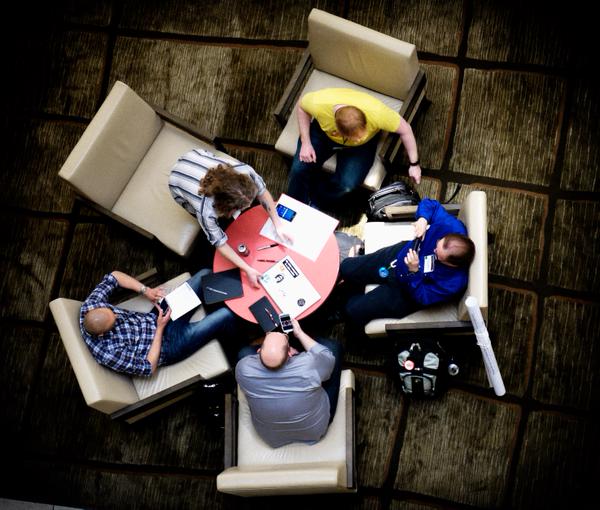Open Repositories 2016 is almost upon us, and that means I once again have the pleasure of (with my cochair Claire Knowles) organising the Ideas Challenge. This is the most fun I have all year!
The Challenge
The Ideas Challenge asks the conference to form small teams and to propose a specific solution to an existing problem. In my mind, there are three main strategic goals to the challenge, and it’s hard for me to decide which is more important.
- It’s an opportunity to discuss the future of repositories. Ideas proposed at previous conferences have become features of repositories. Emerging technologies and infrastructure have been demonstrated to the conference, sparking discussion and debate about their merits.
- It’s a way for developers and non-developers to meet, engage and work together in a relaxed context, outside of their jobs. They get to run a mini-project and bat around blue sky ideas. It is one of the key events that helps to bring the developer community together (developers don’t get let out much under normal circumstances) and many of my contacts in the International Repository Community were formed and grew through developer challenges. This includes my co-chair Claire Knowles.
- It provides a forum for developers and the development process to take centre stage. This should not be underestimated. While policy and business requirements are in the hands of librarians and managers, the software tools that enable Open Access are in the hands of the developers. Having a general conference session at which software, developers and development collaborations are the stars is an important part of the community calendar.
The Themes
Challenges usually have themes. Last year (Claire and my first year of responsibility), the theme was ‘achievable ideas’. Many winning ideas have historically been large-scale, sector changing plans for world domination. While big ideas are valuable and can show strategic priorities, we felt the need to have a look at what progress could be made with small-scale ideas. Last year’s winner proposed allowing authors to submit fulltext documents by responding to automatic emails from the repository requesting they do so (e.g. “Your publication is missing a document, please reply to this email and attach a PDF”). Genius!
This year’s theme will look at ideas to make the lives of academics easier. As another Open Repositories first, we will includes some academics from outside of the conference on the judging panel, including a postgraduate and a professor!
Two meta-themes that have always run through the challenges is the idea of encouraging new collaborations, breaking down barriers between developers and non-developers and having a fun, informal presentation session.
Min Maxing Effort and Utility
The ideas challenge is supposed to fit into the gaps in the conference, perhaps starting with a conversation during a coffee-break, and then throwing together some slides during a lunch. The process is:
- Form a team
- Think of a problem
- Think of a specific technical solution
- Build a four slide presentation
- Introduce the Team
- Outline the Problem
- Overview of the Solution
- Technologies Required
- Give a 3-minute presentation to the conference.
Speaking with a member of the idea team that placed second last year, he estimated the total time at around 90 minutes, but said that he expected it would be shorter with a smaller team (he had 5 members). Their slides were created by photographing scribbles on paper.
I think the presentation session is greater than the sum of its parts, and its parts are really good. Each presentation offers an informed opinion of the future of repositories. As an aggregate, the session give an overview of what is on the minds of the community, what problems the non-developers see, and what technologies and platforms the developer community favour.
The Scoresheet
As a board-game player and some-time game designer, I like the idea that the priorities of the challenge can be codified in a scoring system. Last year we created a scoresheet that would minimise the possibility of a tie. We originally did this to minimise judging effort, and that really paid off. We had the results within 15 minutes of the final presentation, an unprecedented occurrence at Open Repositories. Thanks to this efficiency, this year the Ideas Challenge presentations will be just before the closing session, meaning teams will have even more time to have ideas and create presentations.
This year’s scoresheet has now been created. The scoring systems prioritises the main themes of the challenge and minimises the possibility of a tie. We have also added a ‘newbie’ bonus to encourage those who have never participated to get involved.
Start Your Engines…
How can we make repositories serve the Academic Community better?
Carry this thought around in your head in the run-up to the conference. I am excited to see what you come up with.
